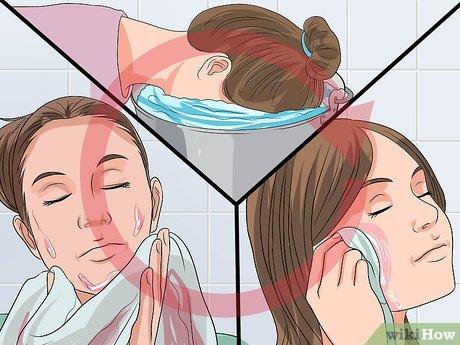Table of Contents
- Understanding the Immediate Physical Reactions to Pepper Spray Exposure
- Effective First Aid Measures to Alleviate Discomfort and Prevent Further Irritation
- When to Seek Medical Attention After Pepper Spray Exposure
- Preventive Strategies to Reduce the Risk of Future Pepper Spray Accidents
- The Conclusion
Understanding the Immediate Physical Reactions to Pepper Spray Exposure
When exposed to pepper spray, your body reacts almost instantly due to the active ingredient capsaicin, which irritates mucous membranes. Expect intense burning sensations on the skin and eyes, accompanied by profuse tearing and an overwhelming feeling of eye pain. The respiratory system may also react, causing coughing, difficulty breathing, and a runny nose. It’s not uncommon to experience temporary blindness due to the swelling of the eyelids and conjunctiva. These physical responses are your body’s natural defense mechanism trying to expel the irritant quickly.
Recognizing these symptoms helps in managing the situation more effectively. Common immediate reactions include:
- Severe eye irritation and inability to open eyes
- Burning sensation on exposed skin
- Coughing, choking, and shortness of breath
- Runny nose and excessive salivation
- Temporary blurred vision or disorientation
Understanding these signs allows you to respond calmly and swiftly, minimizing panic and preventing further harm. It is crucial to avoid rubbing your eyes or skin, as this can worsen the irritation and prolong recovery time.
Effective First Aid Measures to Alleviate Discomfort and Prevent Further Irritation
When exposed to pepper spray, swift and calm action is crucial to minimize pain and prevent worsening symptoms. First, avoid rubbing the affected areas, especially the eyes and face, as this can push irritants deeper into the skin and exacerbate the burning sensation. Instead, move to a well-ventilated area or fresh air immediately to help dilute the airborne particles and reduce inhalation effects. Gently flush the eyes and skin with cool, clean water for at least 10 to 15 minutes-this helps to wash away the chemical irritants without spreading them further.
Additional care tips include:
- Removing contact lenses to prevent trapping irritants against the eye.
- Using mild soap and water to cleanse the skin afterward, but avoid harsh scrubbing.
- Applying a cold compress to soothe inflamed skin and reduce swelling.
- Refraining from applying creams, ointments, or oils unless directed by medical personnel.
If symptoms persist or worsen-such as severe eye pain, difficulty breathing, or extensive skin rash-seek prompt medical attention to address potential complications effectively.
When to Seek Medical Attention After Pepper Spray Exposure
While most pepper spray effects diminish within 30 to 45 minutes, immediate medical evaluation becomes crucial if symptoms persist or escalate beyond typical irritation. Seek professional help without delay if you experience difficulty breathing, severe chest pain, or persistent wheezing. These signs could indicate an acute respiratory reaction requiring urgent intervention. Additionally, uncontrollable eye pain or vision problems warrant an examination by a healthcare provider to rule out corneal damage or other serious ocular injuries.
It’s equally important to watch for systemic reactions such as dizziness, confusion, or swelling of the face, lips, or throat-potential indicators of an allergic reaction or anaphylaxis. In these situations, emergency services should be contacted right away. For less urgent but concerning symptoms, such as prolonged skin blistering or extensive swelling, schedule a visit to your primary care physician or a dermatologist. Remember, timely medical attention can prevent complications and ensure a safer recovery.
- Persistent respiratory distress (wheezing, shortness of breath)
- Severe or worsening eye pain or blurred vision
- Swelling of face, lips, or throat indicating allergic response
- Signs of systemic reaction such as dizziness or confusion
- Prolonged skin irritation with blistering or intense swelling
Preventive Strategies to Reduce the Risk of Future Pepper Spray Accidents
Minimizing the chances of accidental pepper spray exposure begins with awareness and proper handling. First, always store pepper spray in a secure but easily accessible location, away from children and pets. Regularly check the expiration date of your pepper spray as expired products may malfunction or become more volatile. When carrying pepper spray, consider using a holster or keychain holder designed to prevent accidental discharge. Additionally, familiarize yourself with the device’s safety mechanisms and practice activating it in a controlled, safe environment to build muscle memory without risk.
Implementing basic safety habits can significantly reduce exposure risks:
- Never point pepper spray toward yourself or bystanders, even when practicing.
- Use pepper spray in well ventilated areas to avoid inhaling residue.
- Wear protective eyewear if demonstrating or training with pepper spray.
- Immediately clean your hands after handling pepper spray to prevent transfer to eyes or skin.
- Keep emergency contact information readily available for quick access if exposure occurs.
The Conclusion
In the event of accidental pepper spray exposure, quick and calm action is essential to minimize discomfort and potential complications. Remember to avoid rubbing the affected areas, rinse thoroughly with water, and seek fresh air to help alleviate symptoms. If irritation persists or worsens, don’t hesitate to consult a medical professional. Staying informed and prepared can make all the difference in handling such an unexpected situation safely and effectively. Stay safe out there!Check Our Other Blogs
- StunGun – Your Trusted Source for Stun Guns, Laws, and Self-Defense Tips
- PepperSprayLaws – Your Trusted Resource for Pepper Spray Information
- StunGunLaws – Your Trusted Guide to Stun Gun Legality and Safety




